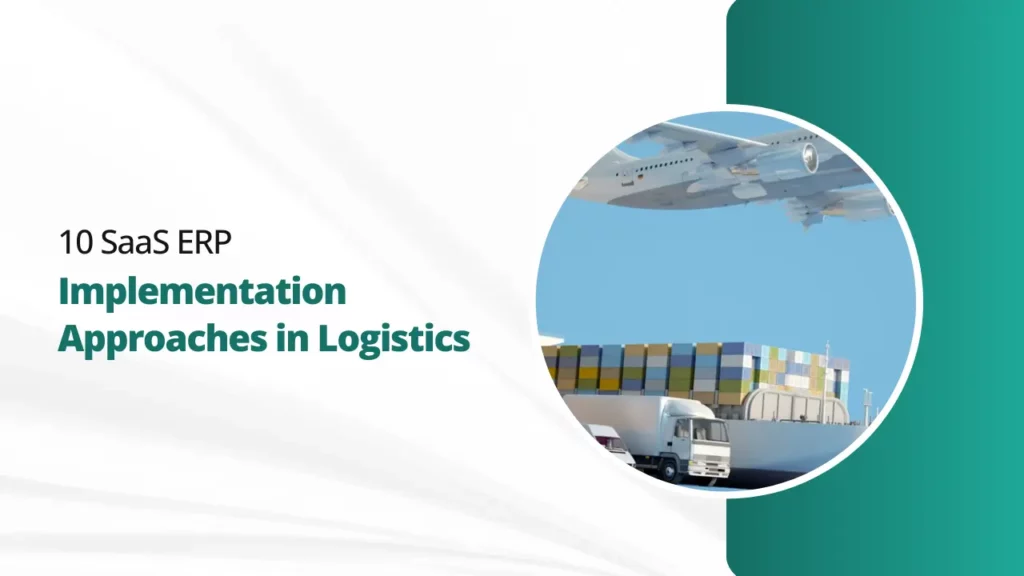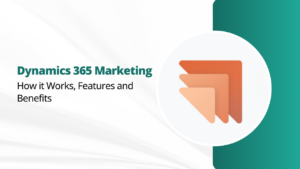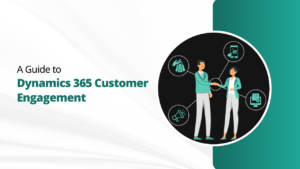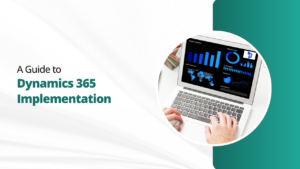In the dynamic landscape of logistics, staying ahead requires adopting cutting-edge technologies. Among these, SaaS ERP systems have emerged as a game-changer. In this blog, we will explore ten strategic approaches for implementing SaaS ERP in the logistics industry, paving the way for enhanced efficiency, transparency, and competitiveness.
The Role of SaaS ERP in Logistics
SaaS ERP plays a crucial role in modern logistics by boosting efficiency. Here’s how:
- SaaS ERP provides real-time visibility into inventory levels, shipment statuses, delivery schedules, and other key logistics data. This allows for quick responses to issues and better decision-making.
- All stakeholders have access to the same information, improving communication and collaboration across the logistics chain.
- Repetitive tasks like order processing, shipment routing, and invoice generation can be automated.
- SaaS ERP integrates with warehouse management systems to optimize shipping processes. This leads to faster delivery times and lower costs.
- It tracks vehicles in real-time and optimizes routes to improve fleet efficiency.
- Customers can track their orders in real-time. This leads to increased satisfaction and reduced inquiries.
- Improved visibility and efficient processes ensure on-time deliveries, boosting customer loyalty and retention.
- Automated workflows and improved data accuracy minimize errors in order processing and fulfillment.
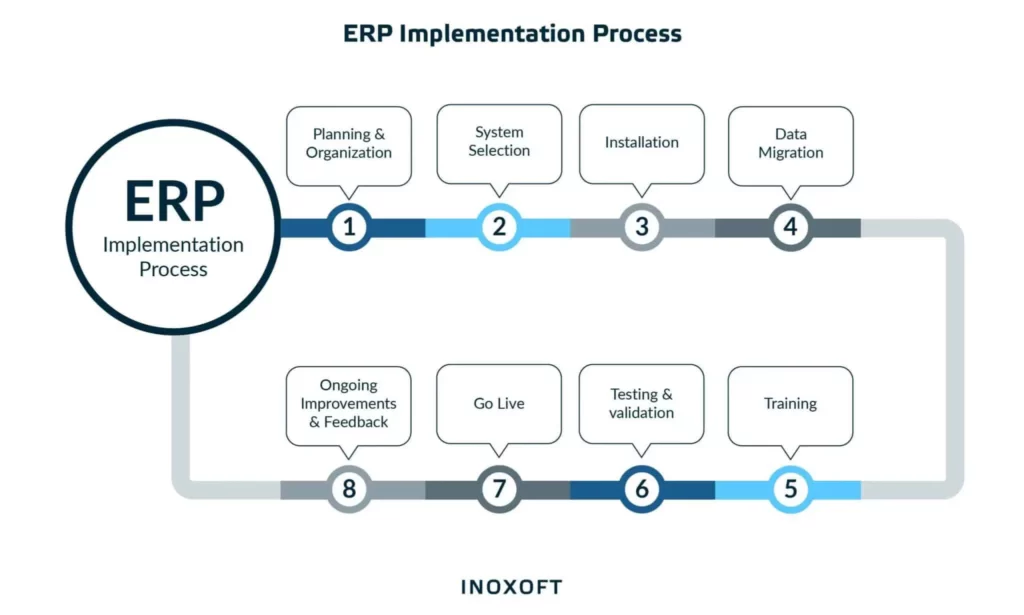
SaaS ERP Implementation Approaches in Logistics
Follow these ERP implementation approaches to enhance your logistics business:
1. Cloud Precision for Logistics Excellence:
Embracing SaaS ERP in logistics means leveraging cloud technology for real-time data accessibility. This allows logistics companies to optimize routes, manage inventory more efficiently, and enhance supply chain visibility. The precision offered by the cloud ensures that decision-makers have the latest information at their fingertips. This facilitates more informed and strategic choices.
Cloud Precision for Logistics Excellence isn’t just a catchy phrase. It’s a revolution waiting to be ignited within your supply chain. Use SaaS ERP, step into the cloud, and witness the metamorphosis of your logistics network.
2. Agile Logistics:
Applying the Agile methodology to logistics involves adopting a flexible and iterative approach. Implementing SaaS ERP with an Agile mindset enables logistics companies to adapt rapidly to changes in demand. This agility ensures that logistics operations remain responsive and can adjust to evolving circumstances.
The Benefits of Agile Logistics:
- Reduced costs: Eliminate waste, optimize processes, and say goodbye to costly delays.
- Thriving customers: Faster deliveries, personalized experiences, and constant dialogue lead to happy customers.
- Operational efficiency: Make informed decisions in real-time, and adapt to disruptions with ease.
3. Data-Driven Decision Making:
SaaS ERP systems in logistics provide a wealth of data. From vehicle performance metrics to demand forecasts, leveraging data analytics enables data-driven decision-making. This approach optimizes logistics operations, reduces costs, and improves overall efficiency by relying on insights extracted from the available data.
Data-driven decision-making is a game-changer in the world of logistics. By unlocking the power of your SaaS ERP system’s data, you can achieve:
- Reduced operational costs: Every efficiency gained translates to a healthier bottom line.
- Enhanced customer satisfaction: Happy customers mean repeat business and positive word-of-mouth.
- Improved agility and responsiveness: Adapt to changing market conditions and unexpected disruptions with confidence.
- Data-backed decision-making: Replace guesswork with actionable insights for informed strategy.
4. Collaborative Supply Chain Management:
SaaS ERP facilitates collaboration across the entire supply chain. Suppliers, manufacturers, distributors, and retailers can share information on a unified platform. This collaboration minimizes delays, reduces communication gaps, and enhances supply chain efficiency.
The Benefits of CSCM are Melodious:
- Optimized inventories, minimized disruptions, and collaborative problem-solving led to significant cost savings for all participants.
- Synchronized planning, and agile adaptation to change boost operational efficiency across the entire supply chain.
- Shorter lead times, improved product availability, and proactive communication lead to more loyal customers.
- The ability to adapt to changing market conditions gives businesses a competitive edge in the business world.
5. Real-Time Tracking and Visibility:
One of the SaaS ERP Implementation Approaches in logistics is the ability to provide real-time tracking and visibility into shipments. This feature enhances customer satisfaction by offering accurate delivery estimates. Moreover, logistics companies can address any issues that may arise during transit. This ensures a smoother and more reliable supply chain.
Benefits of Real-Time Tracking and Visibility in SaaS ERP:
- Track shipments in real-time that provide accurate delivery estimates.
- Optimize routes, minimize delays, and boost warehouse speed, all powered by real-time data.
- Proactively address disruptions, prevent theft, and ensure smooth sailing through data-driven risk management.
- Use real-time insights to adapt to market changes and refine strategies.
6. Mobile Accessibility for On-the-Go Logistics:
Logistics professionals are often on the move. So, SaaS ERP systems with mobile accessibility cater to this need. Access to functionalities on mobile devices ensures that staff can make decisions regardless of their location. This accessibility promotes efficiency and responsiveness in day-to-day operations.
Benefits of Mobile Accessibility for On-the-Go Logistics in SaaS ERP:
- Giving staff instant access to crucial data optimizes their work without being desk-bound.
- Stay connected to your entire operation anytime, anywhere. This unprecedented level of visibility empowers you to react quickly and effectively.
- There is effective communication between drivers, warehouse teams, and headquarters via mobile messaging and collaboration tools.
- Eliminate time-consuming paperwork and manual data entry with mobile forms and workflow automation.
7. Integrated IoT for Smart Logistics:
Integrating the Internet of Things (IoT) with SaaS ERP brings “smart” capabilities to logistics. IoT devices can monitor various aspects of logistics operations. This includes temperature for perishable goods or vehicle conditions for maintenance needs. This integration enhances efficiency, reduces risks, and enables more proactive management of the supply chain.
Benefits:
- Track goods in real-time with sensors. Monitor warehouse equipment performance and optimize routes based on traffic data.
- Proactive alerts for temperature fluctuations, unauthorized access, or vehicle issues allow for quick intervention.
- Gain deeper insights into logistics operations with real-time data from IoT devices. Use this data to optimize processes and identify areas for improvement.
8. Customization vs. Standardization Dilemma:
Finding the right balance between customization and standardization is crucial. Modifying the system to specific logistics needs ensures a solution that aligns with the unique requirements of the business. However, using standard modules creates a striking balance between flexibility and stability.
Benefits:
- Customized solutions cater to specific workflows, industry requirements, and company culture.
- Standardized modules offer established functionalities, frequent updates, and lower customization costs.
- The best approach lies in balancing the need for customization with the advantages of standardization. Consider modular implementation with custom configurations for critical workflows.
9. User Training and Adoption Strategies:
Successful SaaS ERP implementation goes beyond the technology itself. Comprehensive user training ensures that end-users are comfortable with the new system. This, in turn, maximizes the benefits of SaaS ERP and increases productivity.
Benefits:
- Training programs equip employees with the necessary skills to navigate the new system.
- User incentives, feedback mechanisms, and gamification elements can encourage active participation.
- Provide ongoing support through readily available resources to address any issues.
10. Post-Implementation Optimization:
The journey doesn’t end with implementation; continuous improvement is key. Post-implementation optimization involves regular assessments, updates, and fine-tuning of the SaaS ERP system. This ensures that the solution evolves with the changing needs of the logistics industry.
- Review processes, monitor system usage, and gather user feedback to identify areas for improvement.
- Remain flexible and willing to adjust the system as business needs evolve, industry trends shift, and new technologies emerge.
- Continuous optimization ensures that the SaaS ERP system continues to deliver tangible benefits.
Conclusion:
As the logistics industry embraces digital transformation, SaaS ERP is a catalyst for efficiency and innovation. By using these ERP implementation approaches, logistics companies can navigate the future with confidence. This will create a streamlined, responsive, and future-ready supply chain.
If you need any help related to SaaS ERP implementation approaches, contact us.
FAQs
What is ERP in SaaS?
ERP in SaaS refers to Enterprise Resource Planning software delivered through a Software as a Service model, where the software is hosted in the cloud and accessed via the internet.
What are the three types of ERP implementation processes?
The three types of ERP implementation processes are Traditional (Waterfall), Agile, and Phased Rollout, each with distinct approaches to project management.
What type of ERP is used in logistics?
ERP systems commonly used in logistics are often Cloud-based or SaaS ERP solutions.
What distinguishes SaaS ERP from traditional ERP?
SaaS ERP is distinguished by its cloud-based delivery model, allowing users to access the software over the internet.
How does SaaS ERP ensure data security?
SaaS ERP providers implement robust security measures, including encryption, access controls, and regular audits, to safeguard data.

